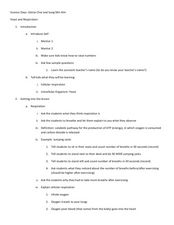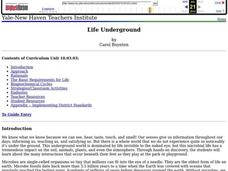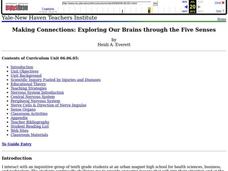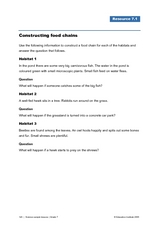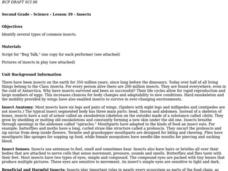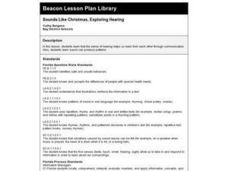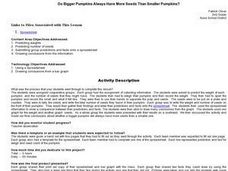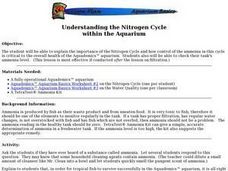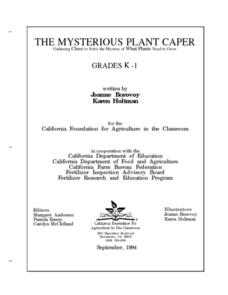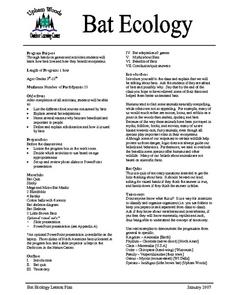Curated OER
Yeast and Respiration
Students explore oxygen properties by conducting a cell experiment in class. In this respiration instructional activity, students discuss the process of breathing and how oxygen is inhaled before carbon dioxide is exhaled. Students...
Curated OER
Life Underground
First graders build a terrarium in order to observe animal and plant life dynamics. In this biology lesson, 1st graders compare how organisms survive in different environments. They write their observations and analysis in their journal.
Curated OER
Making Connections: Exploring Our Brains through the Five Senses
Students identify structures of the brain, and neurons and analyze their functions. In this nervous system lesson plan students create drawings and models of anatomy.
Curated OER
Constructing Food Chains
Students explore different habitats and the food chains within. In this food web lesson students construct food chains for different habitats.
Curated OER
Pumpkin Investigation
Learners examine pumpkins and make a book depicting and describing the inside and outside of a pumpkin.
Curated OER
Insects
Second graders brainstorm and identify several types of common insects. They play bug bingo, building bugs and an insect tree, observing real insects in the classroom and examining some of the things insects make.
Curated OER
Sounds Like Christmas, Exploring Hearing
Students see that the sense of hearing helps us learn from each other through communication. Also, students explain that sound can produce patterns. They engage in a wide variety of activities that focus on the sense of hearing.
Curated OER
What's the Matter? (Grades 6-7)
Students explain the physical properties of matter. They, in groups, perform a variety of experiments, each demonstrating a different property of matter. A very nice, hands-on lesson!
Curated OER
Do Bigger Pumpkins Always Have More Seeds Than Smaller Pumpkins?
Second graders, in groups, predict the weight of a pumpkin and the number of seeds it might have. Then they find and record the actual weight and actual number of seeds. They compare and contrast the size of the pumpkin to the number of...
Curated OER
Dress Up a Twig
Students study the structure and function of the parts of a winter twig. They determine how to identify trees using the twigs.
Curated OER
Understanding the Nitrogen Cycle within the Aquarium
Students discuss ammonia, and ways it may get into the aquarium. They complete a worksheet about the Nitrogen Cycle. Students learn how to get the ammonia and nitrite out of their aquarium.
Curated OER
Trash Bashing
Students define trash, garbage, or solid waste, discuss ways of disposing of trash, list examples of biodegradable materials, and have trash relay race in order to sort trash into appropriate containers labeled biodegradable, reusable,...
Curated OER
The Mysterious Plant Caper
Students investigate the basic parts of plant and that plants are living things which require water, air, light and nutrients for survival. They do this through a series of scientific experiements and multi-curricular hands-on activities.
Curated OER
The Five Senses
Students research the five senses and their location on the body using both literature and the Internet. They design a slideshow that highlights their research on the senses. They study how some people do not have all of their senses.
Curated OER
Sequencing the Cystic Fibrosis Gene: A Simulation
Ninth graders use this activity to simulate the sequencing of gene and to detect the presence of possible genetic defects. They use diagrams that represent bands of nucleotides in order to determine the sequence of a small piece of the...
Curated OER
LEAF (Learning Exercises and Activities in the Forest
Students observe populations and determine the functions (e.g., decomposers, producers, consumers) they serve in an ecosystem. They investigate the energy flow ecosystems. Students investigate factors (.g., Resources, light, water) that...
Curated OER
Our Five Senses
Students are introduced to the five senses through tasks that require them to use each sense in isolation. Students discover how humans use their senses to learn more about their environment.
Curated OER
Bat Ecology
Students, through hands on games and activities, discover how bats live and how bats benefit ecosystems. They play a game designed to show them how echolocation works and another to show how mother bats locate their young through their...
Curated OER
Barnyard Bingo
In this fact and myth worksheet about farm animals, students read 25 statements about common farm animals. Students shade only the boxes that contain true statements. If students get them all right, they will have 12 shaded boxes and 3...
Curated OER
Physical vs. Chemical Changes
In this chemical reactions instructional activity, learners read about the differences between physical and chemical changes in substances. Then students identify situations as either an example of physical or chemical change. Learners...
Curated OER
Chemical Reactions
In this chemical reactions worksheet, students compare endothermic and exothermic reactions, closed and open systems, and reactants and products. Students review physical and chemical changes and how to balance equations. This worksheet...
Curated OER
Insects
In this insects and bugs learning exercise, students choose the multiple choice answer that answers 15 questions or facts about insects and bugs correctly.
Curated OER
Controls and Variables
In this scientific methods worksheet, students identify the control group, independent variables, and dependent variables in 4 different experiment descriptions.
Curated OER
Naming Acids
In this naming acids worksheet, high schoolers are given a chart with polyatomic ions and acid names with oxidation states, prefixes and suffixes. They use the chart to help name the eighteen given acids.


